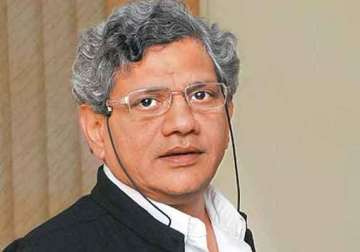New Delhi: Ridiculing BJP's claims that the days of coalition governance were over, CPI(M) today said the party has now “perfected the art” of securing a majority while getting one-third of the votes or even less.
“In the Parliament election, it had won a comfortable majority in the Lok Sabha polling just 31 per cent of the votes cast. In Haryana, it has now won a majority by polling 33 per cent of the polled vote. In Maharashtra, it has won 123 seats polling only 29 per cent.
“The BJP seems to be by now perfecting the art of securing for itself a majority, under multi-polar electoral contests while receiving a third or less percentage of people's support,” senior CPI(M) leader Sitaram Yechury said, calling for radical electoral reforms to correct the anomalies of the ‘first-past-the post' system and “distortion of democracy”.
Referring to Modi's remarks that time for coalition governments was over and it was only for the opposition now to form coalitions, he said such claims by the BJP leaders “sound incredulous”.
BJP also “cannot escape from forming a coalition government in Maharashtra unless, of course, it indulges in the worst form of ‘horse-trading' to muster a majority on its own,” Yechury said in an editorial in the CPI(M) organ ‘People's Democracy'.
Observing that the RSS was “expanding its base precisely by sharpening communal polarisation” in the country, he said it was thus “ably ensuring its political arm, the BJP, to reap electoral benefits by practicing the worst form of ‘vote bank politics' - seeking the consolidation of the majority Hindu vote through sharpening communal polarisation.”
“Unless resisted and resoundingly isolated, the unity and harmony of our society of rich socio-cultural-religious-linguistic diversity will be seriously threatened,” Yechury said.
In an editorial, the CPI organ ‘New Age' too said the BJP was “known for basing its electoral tactics on hastening the process of communal polarisation”.
It also pointed out that parties “with less than 30 per cent support” were gaining power due to the present electoral system and said this brought to focus the immediate need to carry out electoral reforms.
